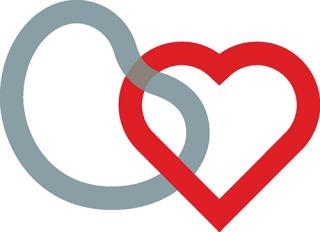
Linda Ulerich, RD
February is heart health month and what better time to think about ways we can all improve our health!
Heart disease (cardiovascular) means you are having problems with your heart and the blood vessels throughout your body. Over time, the blood vessels that bring blood to the heart and brain can become blocked from a buildup of cells, fat and cholesterol. This reduces blood flow to the heart and brain and can cause heart attacks and strokes.
It is well known that people with kidney disease are much more likely than the general population to develop heart and blood vessel disease.1 This increased risk is related to kidney disease and other health problems such as diabetes and high blood pressure as well as certain lifestyle factors including being overweight and smoking. For this reason, it’s very important for kidney patients to take steps to help prevent heart and blood vessel problems. When we begin making changes to help improve our heart health, we are also helping our kidneys to stay healthy as well!
The National Kidney Foundation’s tips to improve your heart and kidney health:
- Get tested
It turns out that heart disease is a risk factor for kidney disease and kidney disease is a known risk factor for heart disease. Hence, if you know you have one, you should have yourself tested for the other. - Eat a balanced, kidney and heart healthy diet
Reduce sodium in your diet. Be sure to stay away from processed foods and choose fresh fruits and vegetables. Reduce foods that are high in saturated fats and cholesterol like eggs, whole milk, cheese and fried foods. Eat more foods that are rich in heart-healthy omega-3 fatty acids. These include cold water fish like salmon, albacore tuna, lake trout and sardines, and other foods like flaxseed oil, canola oil and walnuts. - Increase physical activity
Physical activity offers many health benefits, including decreasing blood pressure, increasing muscle strength, lowering blood fat levels (cholesterol and triglycerides), improving sleep, increasing insulin sensitivity and helping control body weight. And it’ll make you feel good! - Reduce high cholesterol levels
High blood levels of fats like cholesterol increase your chance of developing heart and blood vessel problems. Simple blood tests can check for total cholesterol and other fats in your blood. If your levels are too high, you may need to follow a low-fat diet and exercise more. Some patients may also need to take pills (such as a Statin) to help lower cholesterol. - Keep high blood pressure under control
Follow your treatment plan carefully to control high blood pressure. The blood pressure pills usually preferred for people with kidney disease are called angiotensin converting enzyme (ACE) inhibitors or angiotensin receptor blockers (ARBs). They help to protect your heart. Be sure to follow your fluid and sodium (salt) limits to keep fluid from building up in your body and increasing your blood pressure. Ask your health care team about other steps to help prevent fluid buildup. - If you have diabetes, keep your blood sugar well controlled
Over time, having high blood sugar can cause damage to your eyes, nerves, heart, blood vessels, and kidneys. Good control of blood sugar and other self-management actions can help slow or stop this damage from happening. - Quit smoking
The strongest modifiable risk factor for both kidney and heart disease is smoking. There is nothing that is more important in the prevention of both heart and kidney disease as stopping smoking. Smoking causes hardening of the arteries which causes both coronary artery disease and nephrosclerosis, or hardening of the kidney due to disease of the blood vessels in it. Smoking is also a risk factor for high blood pressure which can cause both heart and kidney disease.
Get started protecting your heart today! Set your own personal goals and begin making changes one at a time. Your healthcare provider can help you prioritize your areas of change. If you already have some degree of kidney dysfunction, you may need to alter some of the above recommendations according to your unique situation. Your kidney doctor and your dietitian can assist with these changes.
Originally posted by NKF National on www.kidney.org
